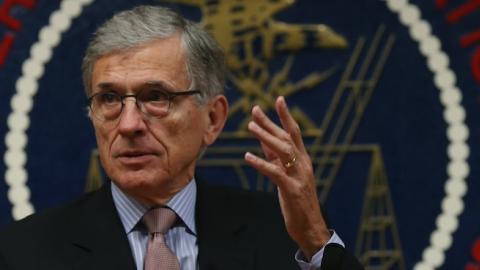On Thursday the Federal Communications Commission will stop accepting public comments on the divisive plan to regulate the Internet as a public utility before bringing the matter to vote on Feb. 26. The latest lunge at more Web regulation puts global Internet freedom and prosperity in jeopardy and fatally undermines decades of bipartisan consensus on America’s foreign policy for the Internet.
Some proponents of more Internet regulation—for instance, President Obama —maintain that “the strongest possible” laws are needed to prevent Internet service providers, such as cable and phone companies, from acting in anticompetitive ways and harming consumers by, say, blocking selected Web destinations. They argue that the FCC must declare the Internet a public utility under Title II of the Communications Act of 1934, which was designed for the Ma Bell phone monopoly. FCC Chairman Tom Wheeler announced last month that he would align his proposals with the White House.
This represents a stunning reversal of the policies of the Clinton and Bush administrations. Both presidencies pursued a highly successful “hands-off” approach toward the Internet and argued that the dynamic network should not be regulated like a public utility domestically or internationally. The result: The Internet is the greatest global deregulation success story of all time.
President Obama equates 1934 telephone services with the 21st-century Internet. In an unprecedented directive in November to the supposedly independent FCC, he proclaimed that it is “common sense” to apply old-fashioned utility rules to “the transmission of information—whether a phone call, or a packet of data.”
The more than 1,000 regulations in Title II include the power to set “rates, terms and conditions.” Even though the agency promises to refrain, or “forbear,” from much of Title II, the agency has recently expanded its agenda to heap even more parts of the law onto the Web. No matter how much the FCC vows to restrain itself, crossing into telephone-style regulation will legitimize international efforts to do the same, a trap the U.S. has tried to avoid.
The FCC’s new definition of the Internet as a phone network could trigger expanded jurisdiction over the Web through existing treaties of the International Telecommunication Union, a regulatory arm of the United Nations. In reaction to similar proposals in 1998, President Clinton’s FCC chairman, William Kennard, presciently said “classifying Internet access services as telecommunications services could have significant consequences for the global development of the Internet.”
Similarly, when in 2010 the FCC last examined—and rejected—the Title II idea, Mr. Obama’s own State Department telecom policy ambassador, Philip Verveer, now a top FCC adviser, expressed deep concern. He cautioned that FCC regulation could provide other nations with a justification for “preventing unwelcome political, social or cultural information from being disseminated to their citizens.”
In 2012 at the World Conference on International Telecommunications, which we both attended as members of the American delegation, the U.S. led a coalition of 55 nations that refused to sign a global treaty that would presume new authority to regulate disparate aspects of the Internet. Now, however, the Obama administration is signaling to the world that more government regulation of the Internet should be the norm.
The FCC’s plan could revive a ruinous 2012 proposal by a handful of European phone companies and many member states of the International Telecommunication Union. The plan was to sanction “sending party pays” fees for international Internet traffic that terminates on networks owned by foreign phone companies. This would increase costs for consumers as Internet companies would have to pay fees, as a matter of international law, that would be passed on to all Internet users.
China is advancing a proposal to make a special committee of the U.N. General Assembly the dominant body to determine global Internet governance. Does anyone think that’s a good idea? Meanwhile, Russia has joined China in sponsoring an “international code of conduct for information security” at the U.N. that would authorize Internet censorship and enshrine multilateral state control of the global network.
Many countries, including Iran, Saudi Arabia, the United Arab Emirates and Brazil, will be advocating their vision of the Internet’s future at a major international conference at U.N. headquarters in New York at the end of 2015. Global multilateral oversight and regulation of the Internet is their goal.
The Obama administration and its FCC have chosen a perilous moment to reverse decades of bipartisan agreement to limit Internet regulation. They can’t have it both ways. By creating an irreconcilable contradiction between America’s domestic and foreign policies, the cause of an open and freedom-enhancing global Internet will suffer.


















